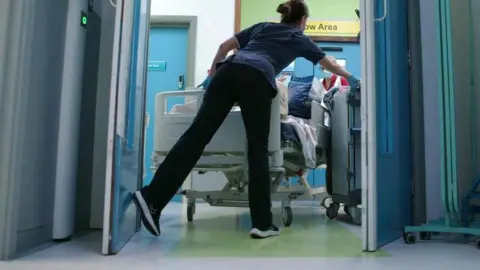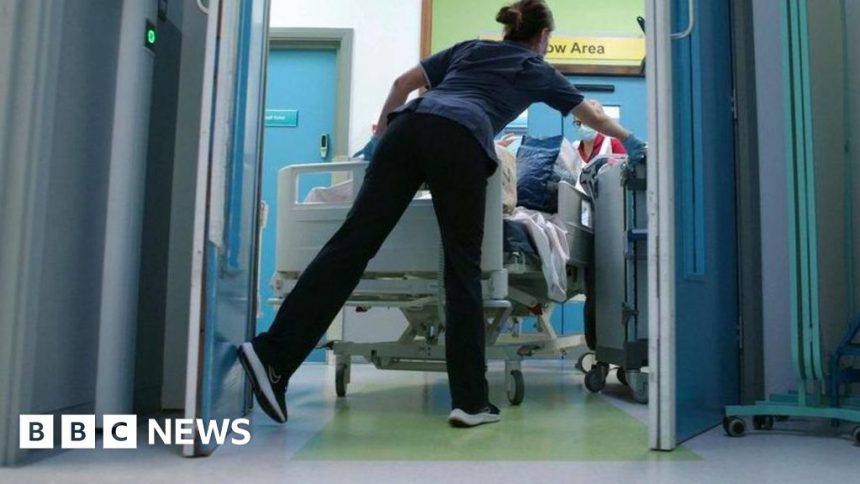Patients dying in hospital corridors, say nurses
 Getty Images
Getty ImagesPatients are dying in corridors and pregnant women are miscarrying in side rooms as overwhelmed hospitals struggle to cope, nurses say.
The Royal College of Nursing (RCN) said evidence provided by more than 5,000 of its members across the UK this winter also showed cupboards, car parks, bathrooms and nursing stations were being turned into makeshift areas for patients.
Nurses warned such practices put patients at risk as staff were unable to access vital equipment such as oxygen, heart monitors and suction equipment, and did not have the time and space to provide CPR.
Health Secretary Wes Streeting said he agreed the problems should not be tolerated, but laid the blame on the previous government.
However, RCN general secretary Prof Nicola Ranger said the findings should act as a “wake-up call” to Labour.
“Patients are being stripped of their dignity and lives put at risk,” she said.
Embarrassed
Prof Ranger said increased investment was needed and “questions need to be asked” about whether this government had done enough to head off the winter pressures being seen.
Last week more than 20 NHS trusts declared critical incidents, as high levels of flu and the bad weather put huge pressure on hospitals.
Prof Ranger said corridor care, as it has become known, was becoming normalised across the UK and she warned that without action it would hamper the government’s key priority in England of reducing the waiting list for non-urgent care.
The RCN published more than 400 pages of testimony from its members about the problems they had been seeing.
These included:
- People having cardiac arrests in corridors or cubicles which are blocked by patients on trolleys, delaying life-saving CPR
- Others dying on trolleys and chairs in waiting rooms with one nurse saying the NHS was “no better” than the developing world
- Women miscarrying in side rooms, which nurses said was not only distressing for patients but made it difficult to monitor for deterioration
- An incontinent, frail patient with dementia having to be changed next to a vending machine in a corridor
- Cases where 20 to 30 patients have been left in corridors under the care of one nurse and healthcare assistant
- Elderly patients left to sit on chairs for days and spending hours in beds on corridors in soiled clothing
“We permanently have corridor care now,” one nurse said. “Patients don’t have the dignity and care they should have. To be quite honest, it breaks my heart.”
Another nurse, who normally worked in critical care but was redeployed to A&E, said: “I felt embarrassed to work for the NHS and, for the first time, I could see it was broken.
“Never in my 30-year career could I have imagined this would become a ‘norm’ but it is.”
Harrowing
One RCN member from the south-east of England said she was now working on corridors nearly every shift and had seen some particularly “harrowing” cases recently.
She described how one dying patient in her 90s, who had dementia and respiratory problems, had been left in a corridor for eight hours and staff had been unable to provide her with appropriate end-of-life care.
“The patient behind her was detoxing – he was vomiting and extremely abusive. It’s just not dignified. You take your dog to the vet and they get better care.
“We are not caring for patients in the way we would like to.”
In a statement to the House of Commons on Wednesday about the pressures being seen this winter, Streeting blamed the previous government.
“I want to be clear, I will never accept or tolerate patients being treated in corridors.
“It is unsafe, undignified, a cruel consequence of 14 years of failure on the NHS and I am determined to consign it to the history books.
“I cannot and will not promise that there will not be patients treated in corridors next year, it will take time to undo the damage that has been done to our NHS.
“But that is the ambition this government has.”
NHS England chief nursing officer Duncan Burton said “increasing demand” had put extreme pressure on the health service over recent months, and described this winter as “one of the toughest the NHS has experienced”.
“The impact this has on the experiences of patients and staff, as highlighted by the RCN report, should never be considered the standard to which the NHS aspires.”
Chris McCann, of the patient watchdog Healthwatch England, said: “These devastating stories shared by nurses echo experiences that people tell us about.
“Patients say they’re witnessing stressed and overstretched staff who are valiantly trying to cope with these extreme pressures.”






